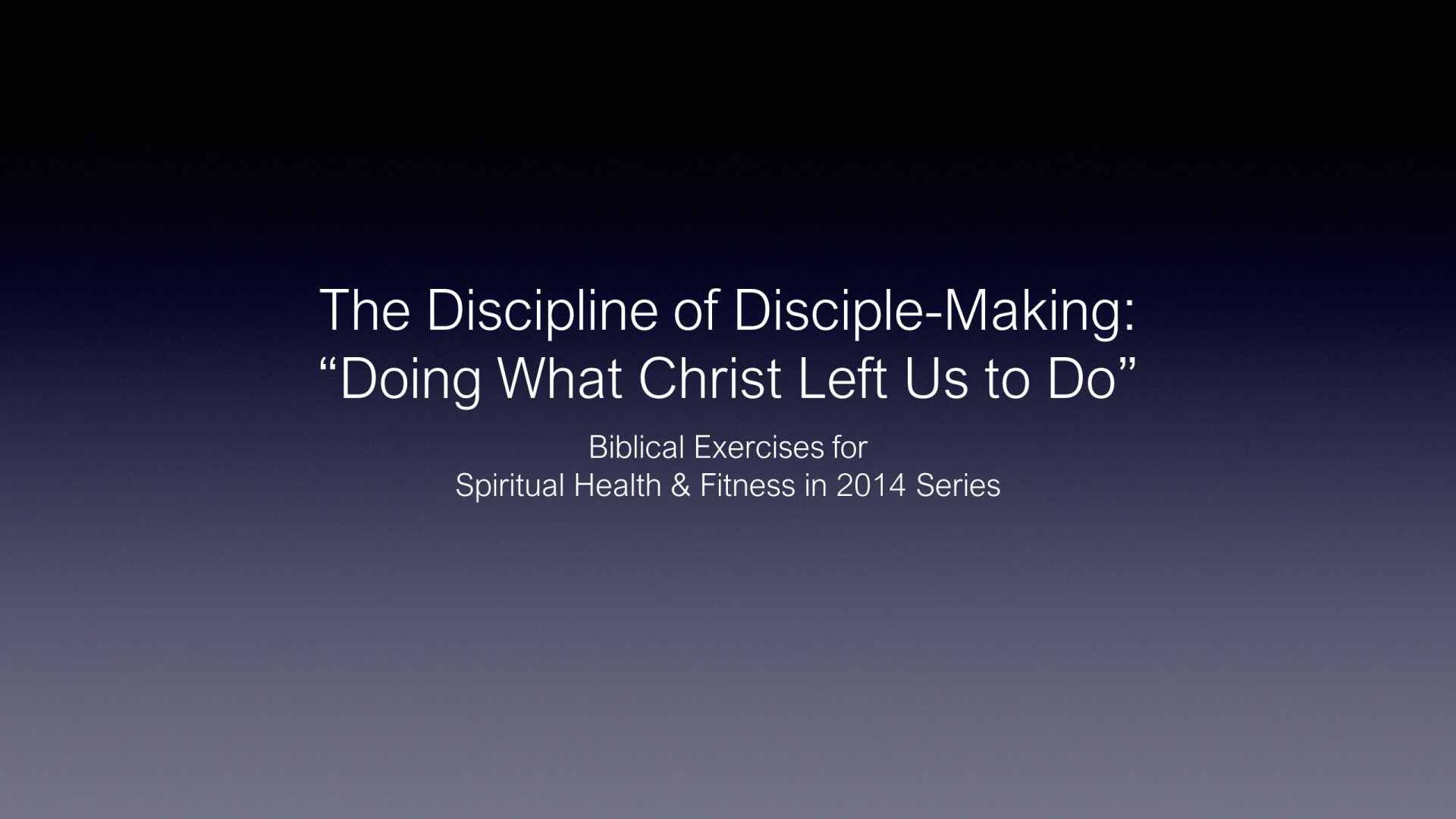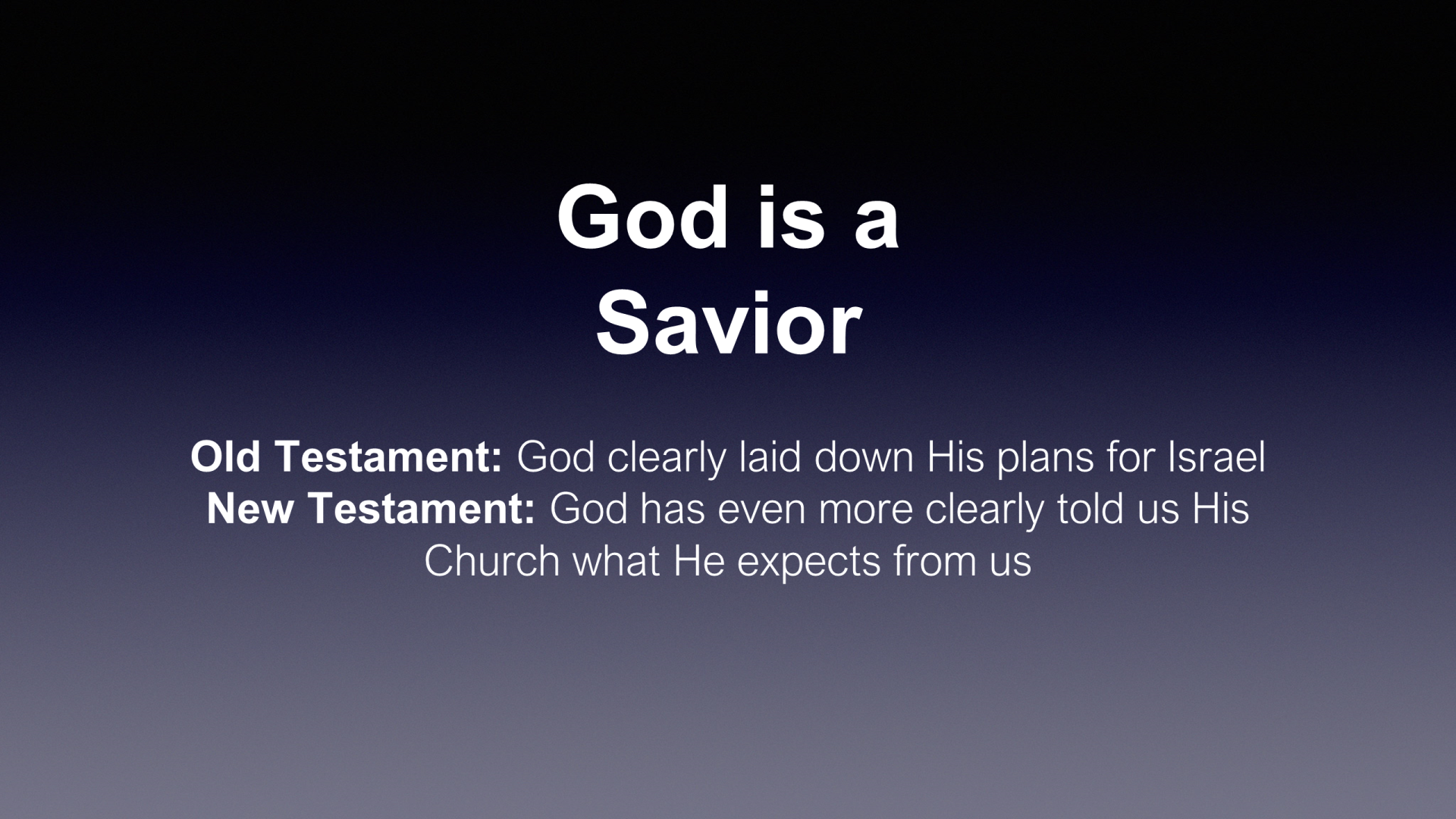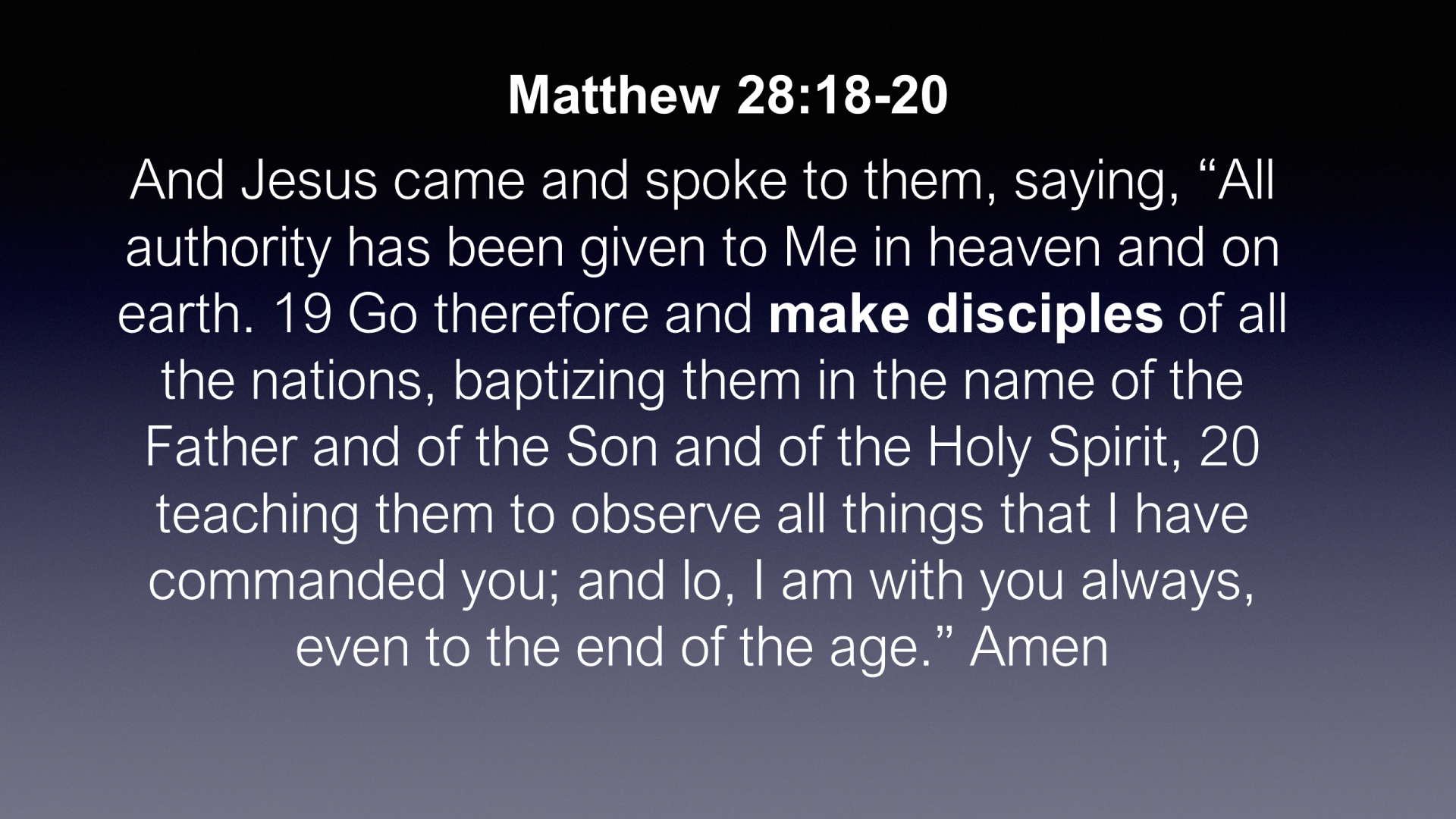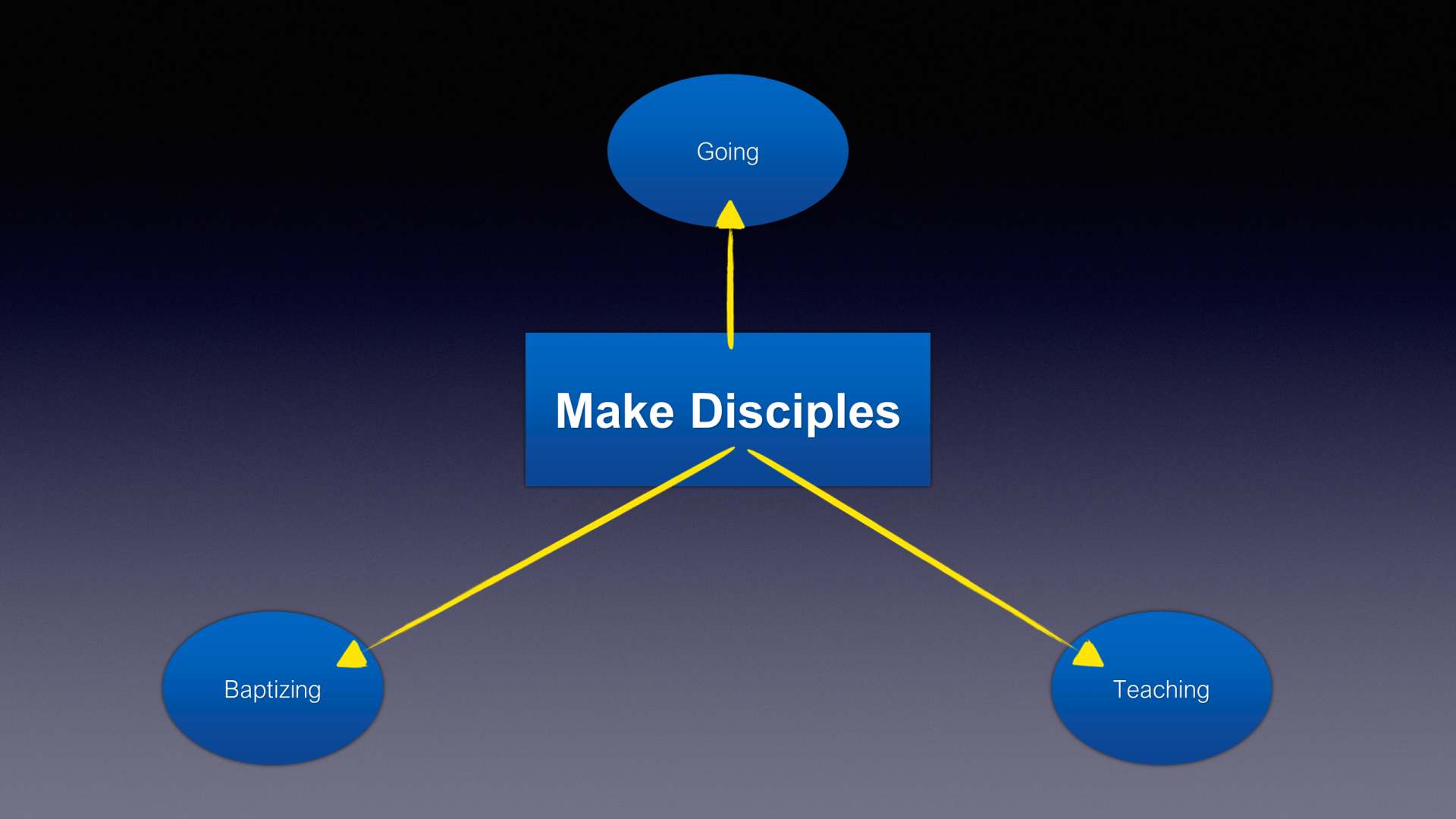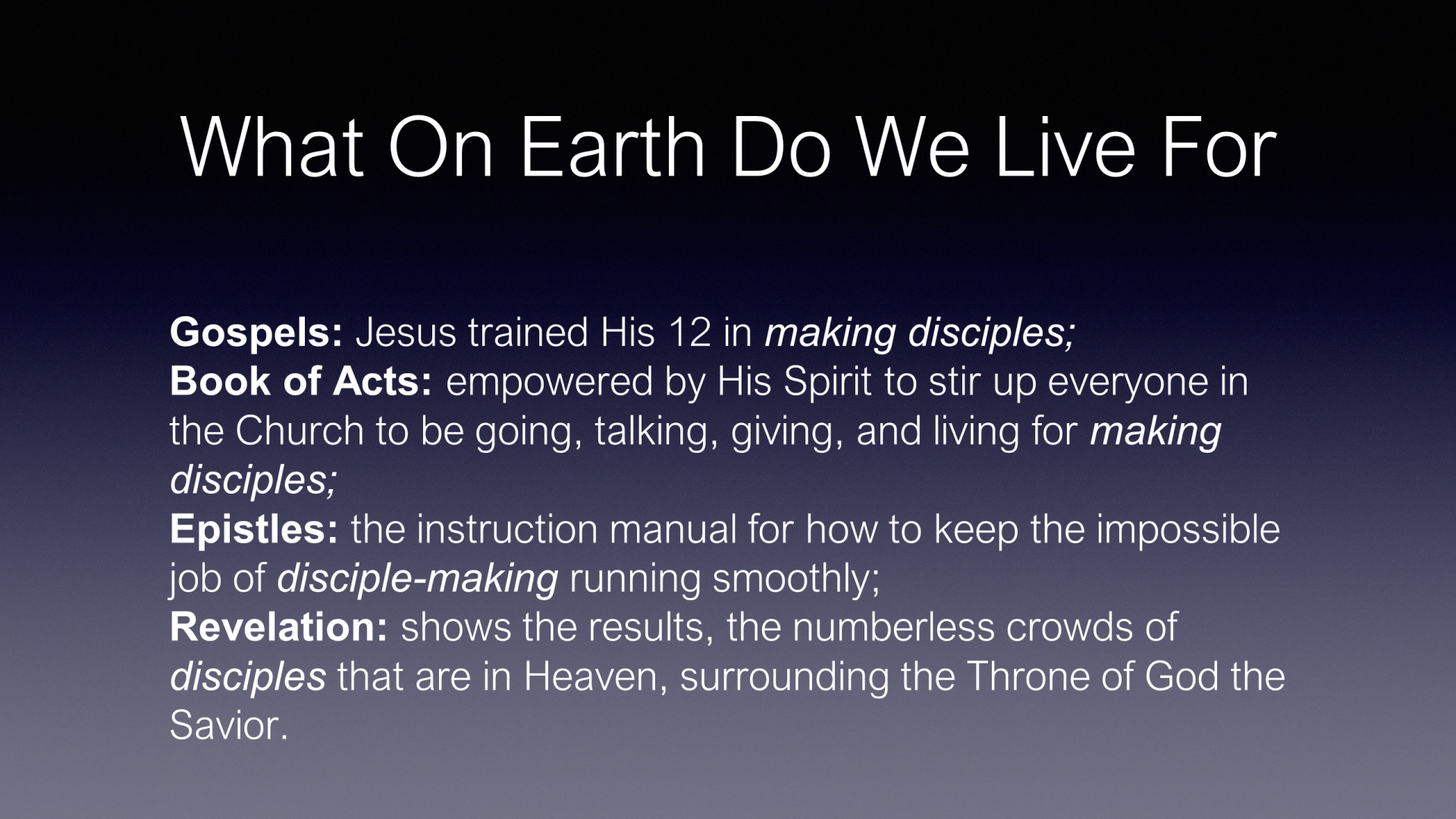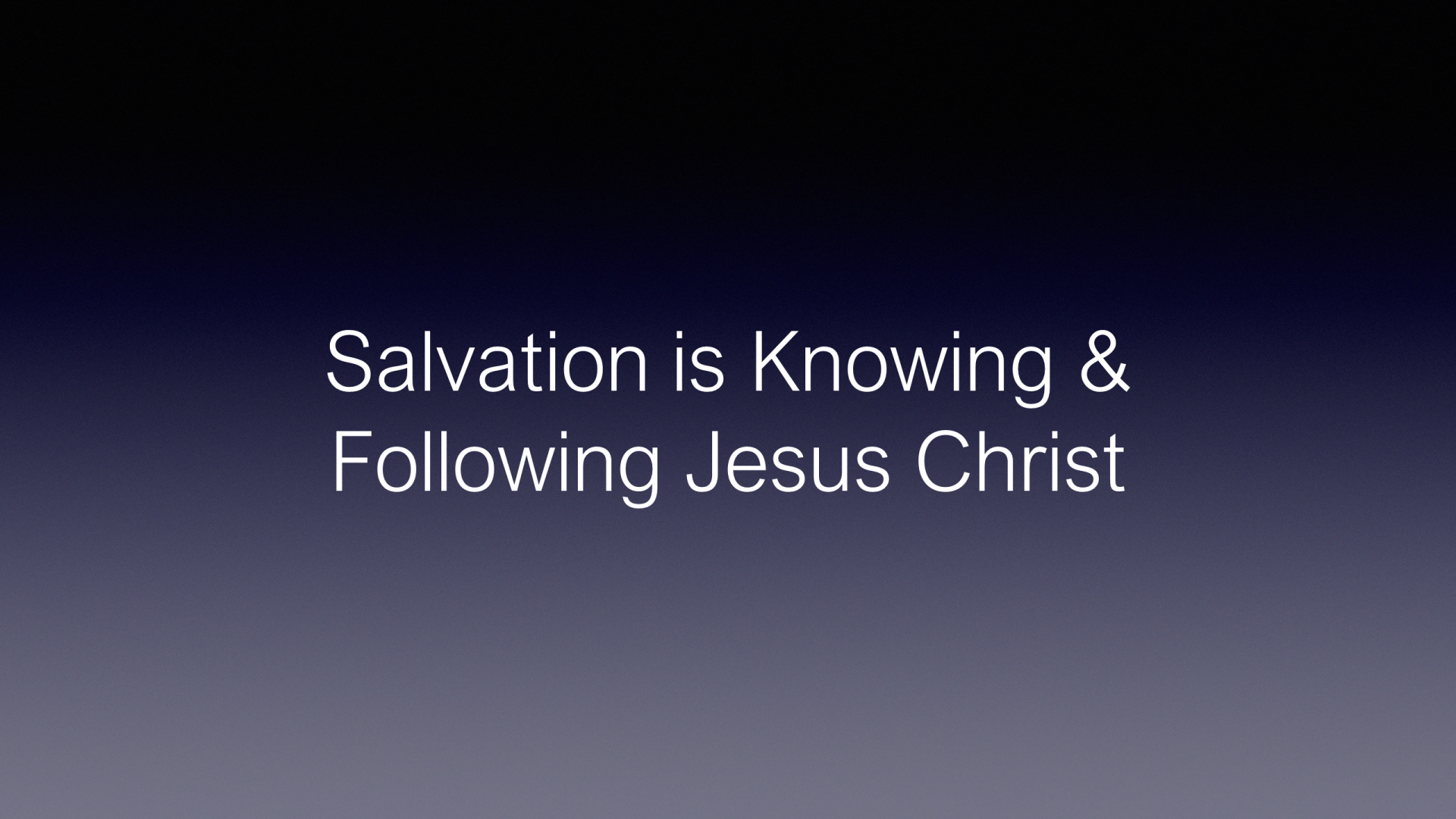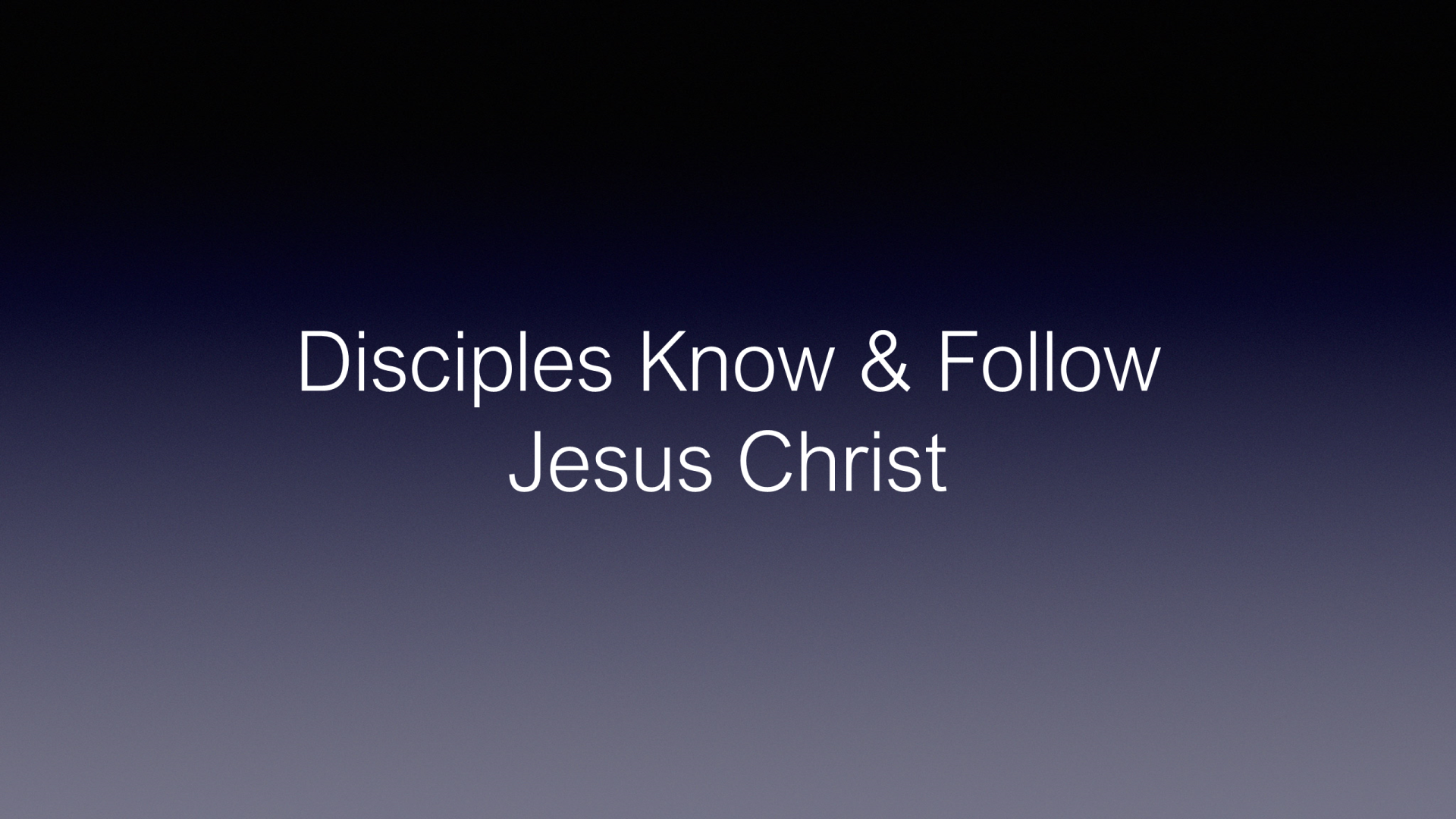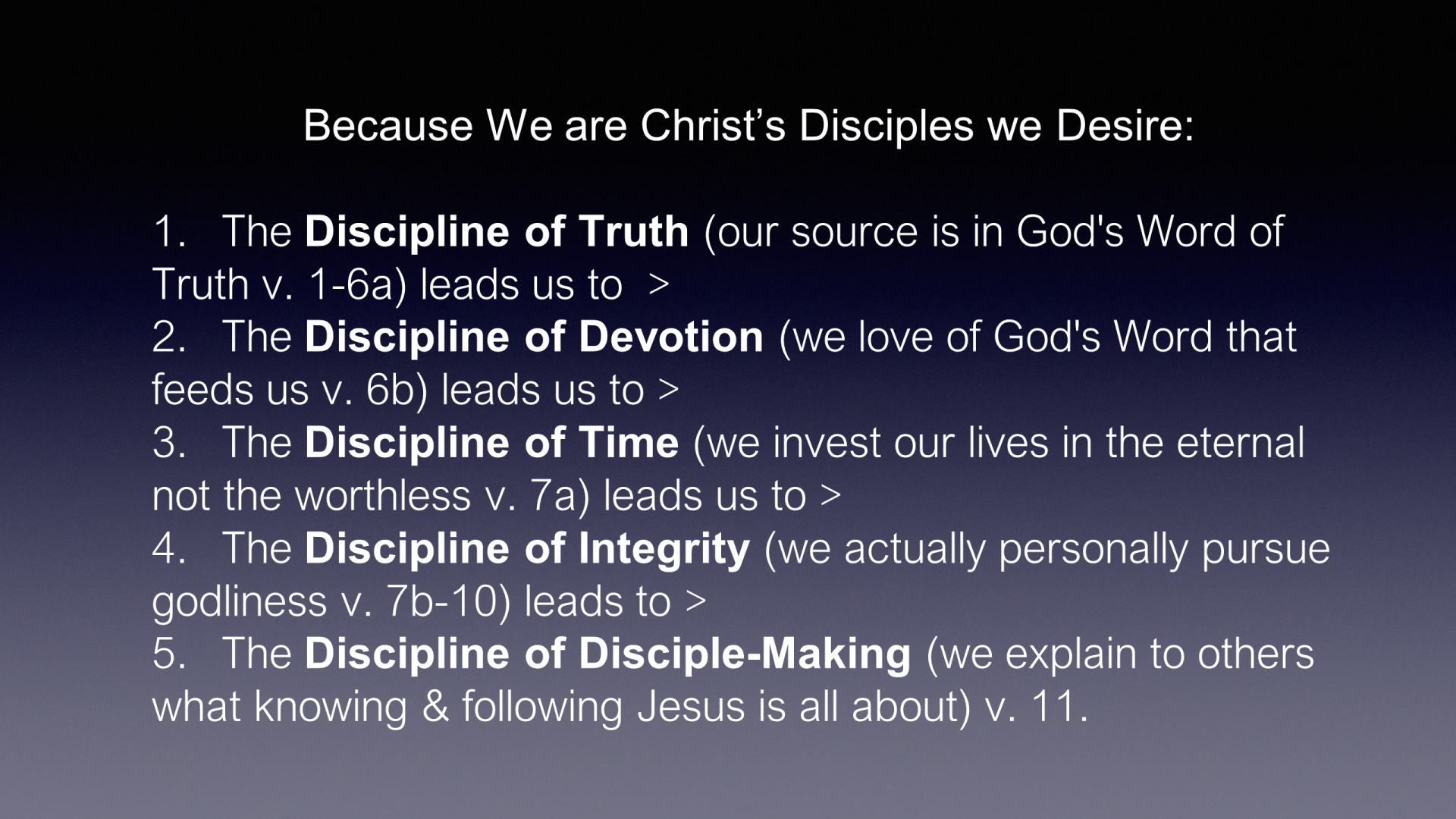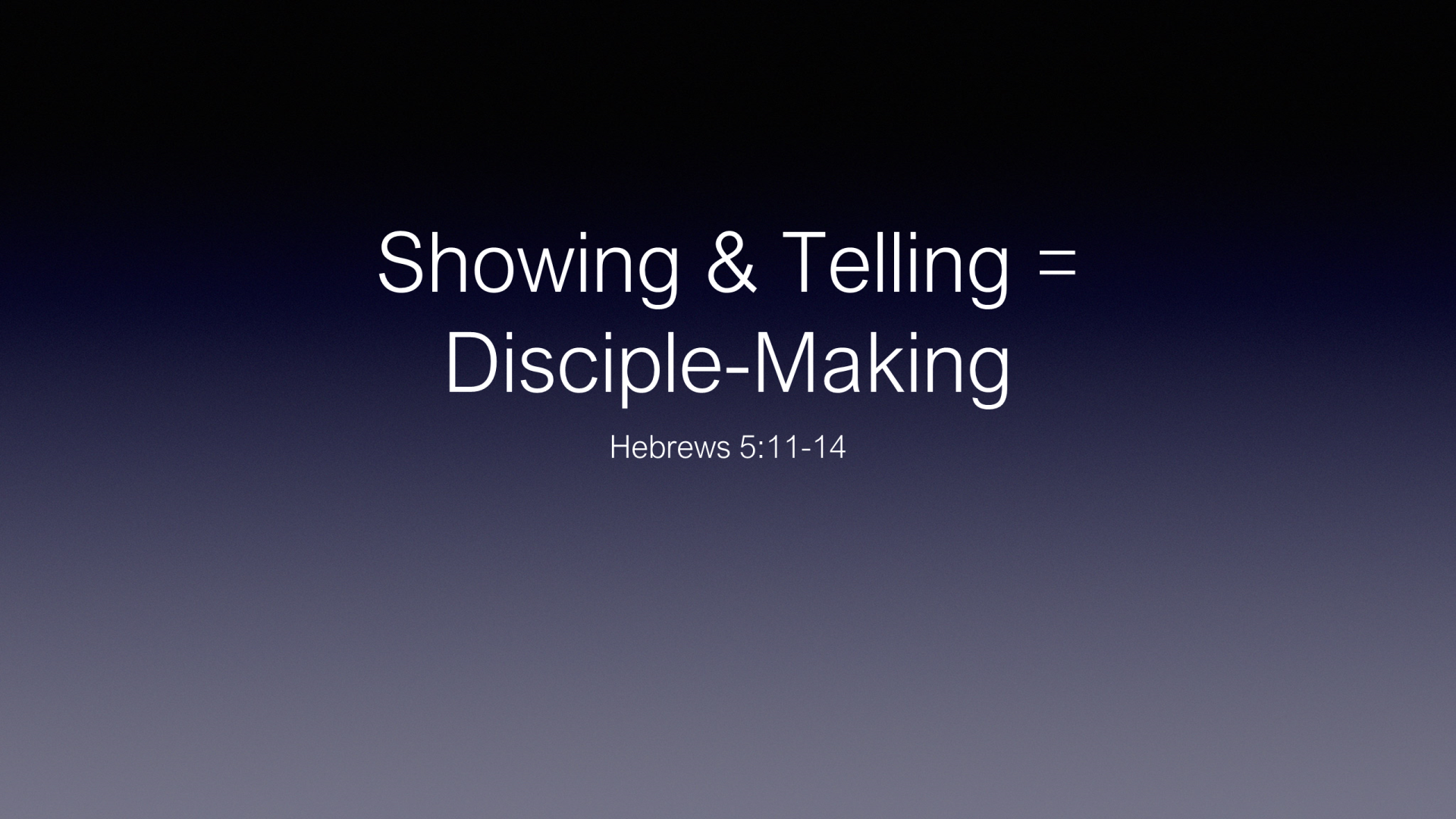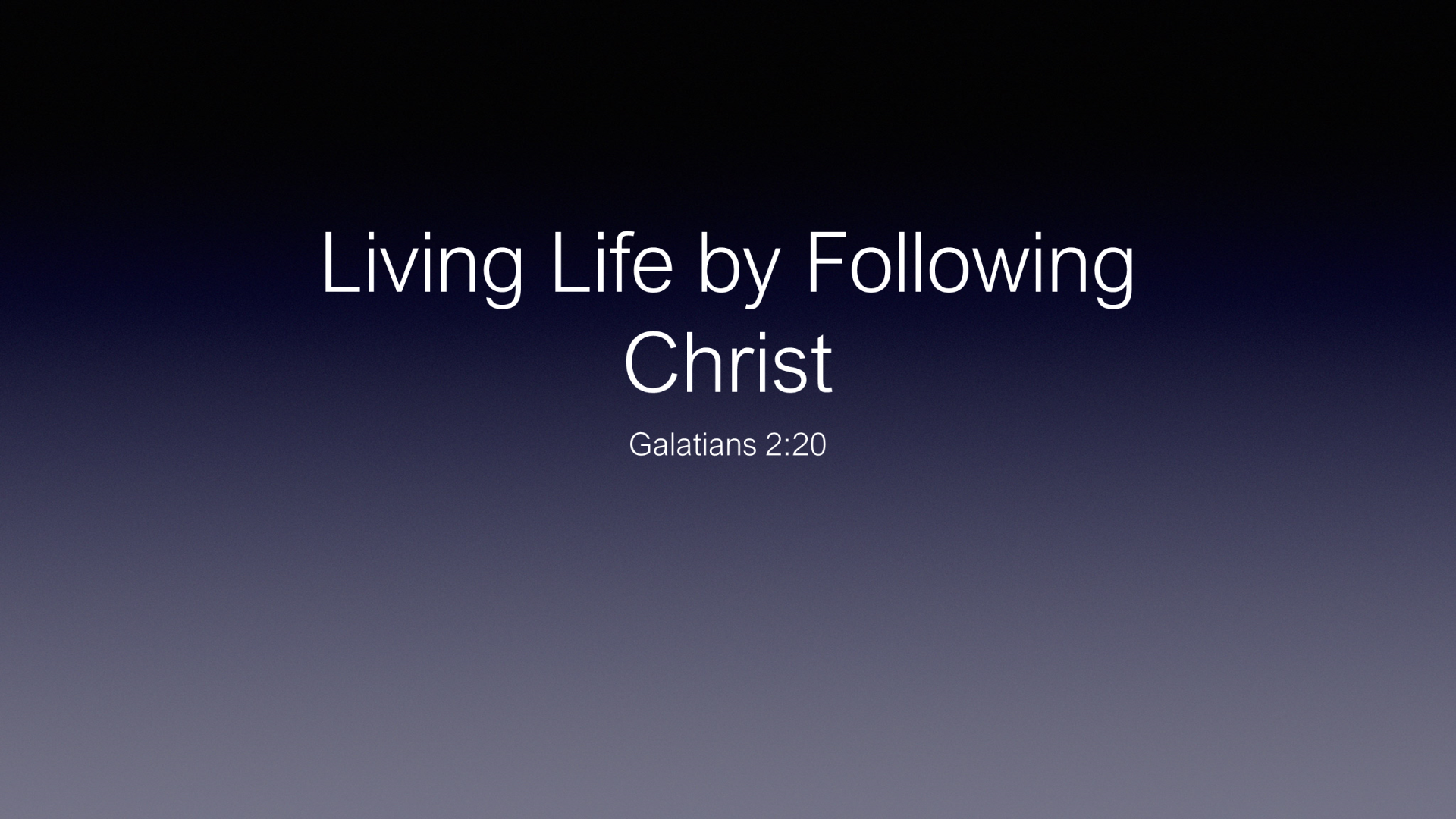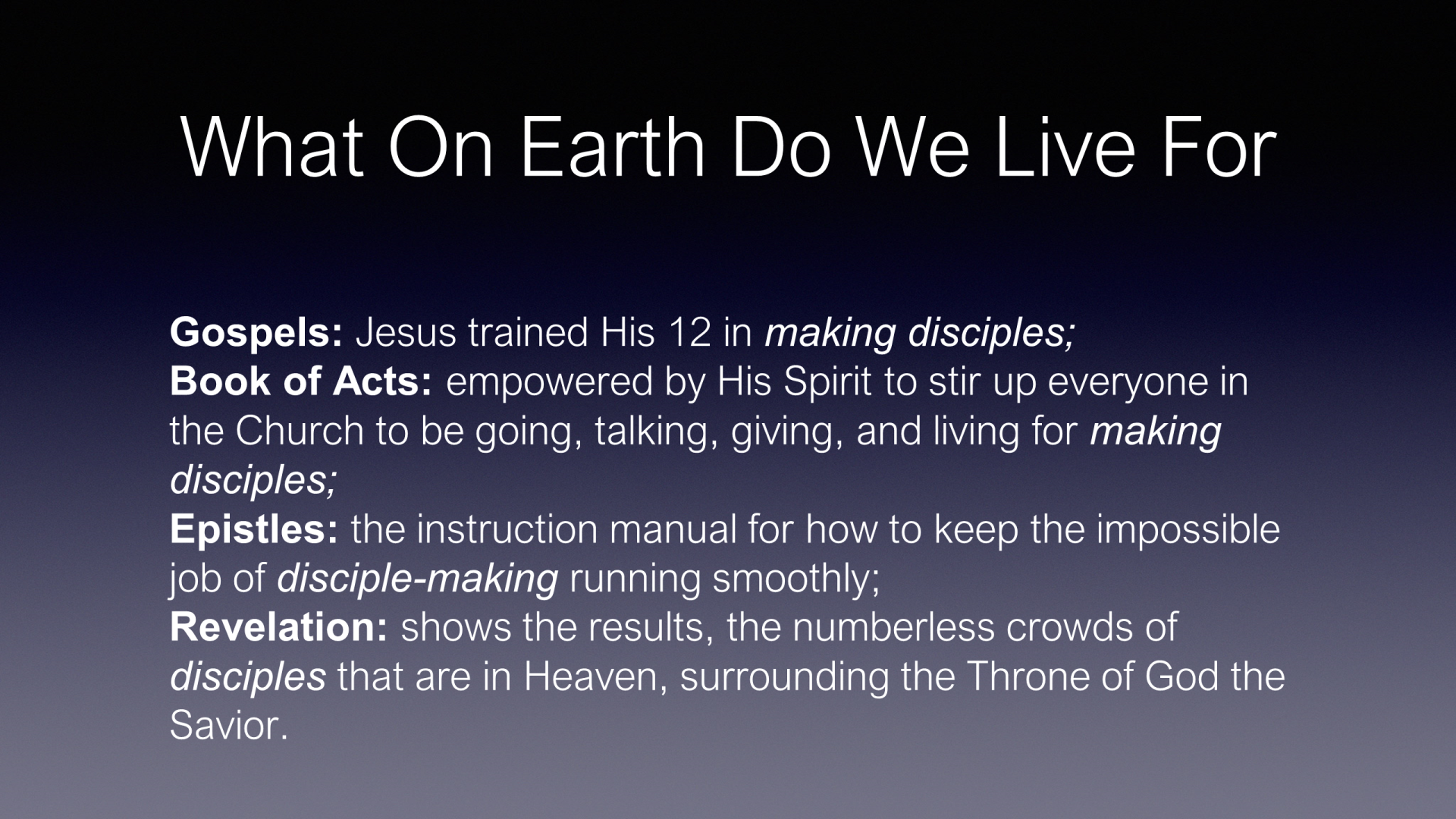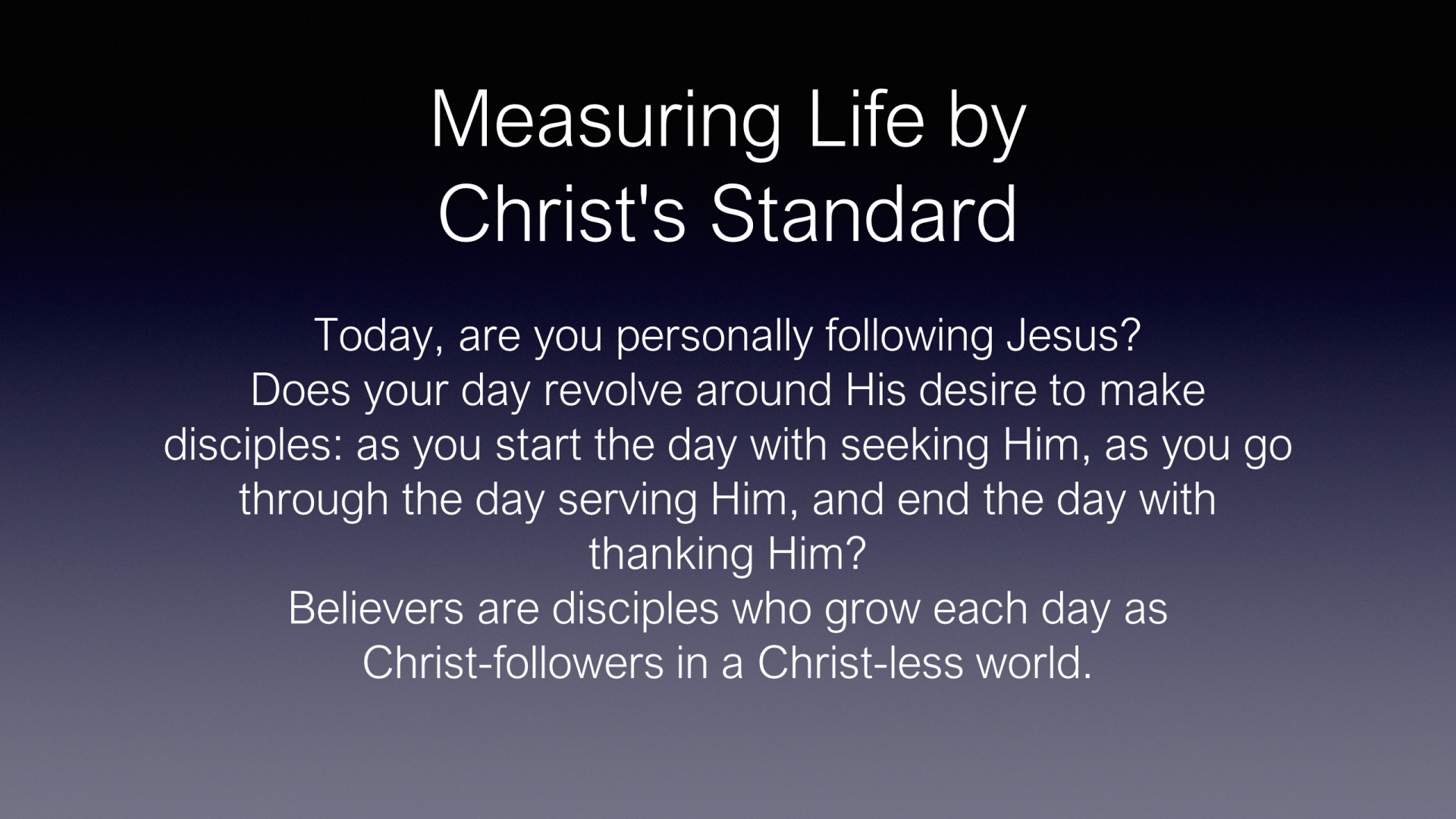If the YouTube video above is not available, here are two other ways to view:
140323AM
ESH-10
Disciple-Making.docx
Biblical Exercises for Spiritual Health & Fitness in 2014 Series
The Discipline of Disciple-Making:
“Doing What Christ Left Us to Do”
1 Timothy 4:11
As we come to the Discipline of Disciple-Making, we come to our very own personal Job Description, left by Christ as the reason He saved us and left us here to serve Him through life. A question that should frame each day of our lives is: “Am I Doing What Christ Left Me to Do?”
God has always desired to be glorified by reaching this world with His message of love, His forgiveness of sin, and His offer of reconciliation leading to eternal life. God is not willing that any should perish, so He has always desired that the world to hear His message and repent, so that they may be saved. Because:
God is a Savior
God had Noah preach for a hundred years calling the world to repent. God established Israel as a light to the nations, but they mostly refused, so He set them aside temporarily.
God has for the past 2,000 years worked through His Church to spread His message of love, forgiveness, repentance, and reconciliation unto life eternal. God has future plans clearly written down for Israel to again spread His message around the world as Revelation 7-14 details. But for now, we the Church are His plan.
So God has always been glorified through people who would witness and proclaim His message of salvation. At this moment, God is working His plan of redemption through us His Church. Just as in the Old Testament, God clearly laid down His plans for Israel, as Deuteronomy says: they were to cling to the Lord, love the Lord, serve the Lord, and through their love for outsiders, they were to share His love, and declare His faithfulness. As the Old Testament details, Israel sadly disregarded that calling and commission, and so God temporarily sets them aside.
Now, as the New Testament opens, God has even more clearly told us His Church what He expects from us. In fact, at the climax of Christ’s earthly ministry, He gathers His Apostles, and in the power of the Resurrection, they as the leaders of the first generation of the Church were: given His Clear Commission. As we open to Matthew 28, we are opening to the amazing linkage of God the Savior’s plan, given to Israel but ignored by them; and now given to us His Church.
The magnitude of these words has never faded. These are the clearest marching orders for every believer alive today. Matthew 28:18-20 is the distillation of all that Jesus was doing in His Earthly ministry as recorded in the Gospels. All the rest of the Epistles are written as examples and explanations of the Great Commission to the Church. Revelation is the finish of the Church’s term of service, and the return of Israel to active duty. Please stand, and hear in no uncertain terms God’s plans, expectations, and desires expressed in our Commission:
Matthew 28:18-20 (NKJV) And Jesus came and spoke to them, saying, “All authority has been given to Me in heaven and on earth. 19 Go therefore and make disciples of all the nations, baptizing them in the name of the Father and of the Son and of the Holy Spirit, 20 teaching them to observe all things that I have commanded you; and lo, I am with you always, even to the end of the age.” Amen.
What On Earth Do We Live For
The key that unlocks why God has left us here on Earth, after our salvation, is in verse 19 where Christ said: “Make disciples.” These words were carefully engineered by the Spirit of God to explain the focus of every day of our lives, if we want to please God.
All the other verbs in v. 19 are participles: “going”, “teaching”, “baptizing”. Long ago in English grammar we all learned that participles are verb forms that are to modify the main verb. Just as each participle points itself towards the main verb, and is attached completely to that main verb: so each of us are to live our life with every part of us in some way attached to the purpose in life we have been given by God: making disciples.
The purpose of the Church is to make disciples. In the Gospels, Jesus trained His 12 in making disciples. Then here at the Great Commission, Jesus Christ charged the disciples as He was leaving: to connect and point everything they did in life towards that goal of disciple-making.
The Book of Acts is the record of how those men were used by God, and empowered by His Spirit to stir up everyone in the Church to be going, talking, giving, and living for making disciples.
The Epistles become the instruction manual for how to keep the impossible job of disciple-making running smoothly: since only obedient, surrendered, Spirit-filled believers are able to make disciples.
Then, Revelation shows the results, the numberless crowds of disciples that are in Heaven, surrounding the Throne of God the Savior, worshipping Him because of His wonderful message of love, His forgiveness of sin, and His offer of reconciliation leading to eternal life.
God’s desire could not be clearer. God’s plan for us could not be more simply stated. The Great Commission is focusing every part of our life upon the main verb of God’s plan: making disciples of all the nations, kindreds, tongues, and tribes of people. God is glorified as He is proclaimed for Who He really is: God the Savior.
When I was sent out as a pastor from Grace Church in the 1980’s, I will never forget what John MacArthur taught us men, trained under his ministry[1]:
“The mission of the church is not fellowship, the mission of the church is not teaching and preaching, the mission of the church is not praise and worship. Those are all functions of the church, which strengthen it and motivate it and direct it toward the mission of the church, which is to make disciples of all nations, all people, all races, all tribes, all ethnic groups across the face of the earth. That’s the only reason we’re here because every other function of the church would be better accomplished in heaven, better fellowship, better knowledge of the truth, better worship in heaven. The reason you’re here in this world, is so that you might be an instrument by which God can reconcile others to Himself.
Salvation was simply described by Jesus in John 10, as we open there next, to John 10:27, note what Jesus says: Jesus Christ is the Shepherd, and we are His sheep if we hear His voice, He knows us, and we follow Him.
Salvation = Knowing & Following Jesus Christ
Follow along with me as I read those words:
John 10:27 (NKJV) My sheep hear My voice, and I know them, and they follow Me.
Really knowing Jesus Christ leads to really following Him. Knowing & following Jesus is the call of every believer, and the only assurance of really being a member of God’s family.
Earlier, at the start of His public teaching, at the end of His longest message, note what Jesus said about knowing and following Him. Turn back there with me to Matthew 7:13. As we read these words in just a moment, remember that this is a public message, directed at Christ’s disciples. We who are also His disciples, followers, and those who know Him, should be reminded again about how serious Jesus was about the call to salvation. Please stand and listen with me to the voice of Christ through His Word:
Matthew 7:13-29 (NKJV) “Enter by the narrow gate; for wide is the gate and broad is the way that leads to destruction, and there are many who go in by it. 14 Because narrow is the gate and difficult is the way which leads to life, and there are few who find it. 15 “Beware of false prophets, who come to you in sheep’s clothing, but inwardly they are ravenous wolves. 16 You will know them by their fruits. Do men gather grapes from thorn bushes or figs from thistles? 17 Even so, every good tree bears good fruit, but a bad tree bears bad fruit. 18 A good tree cannot bear bad fruit, nor can a bad tree bear good fruit. 19 Every tree that does not bear good fruit is cut down and thrown into the fire. 20 Therefore by their fruits you will know them. 21 “Not everyone who says to Me, ‘Lord, Lord,’ shall enter the kingdom of heaven, but he who does the will of My Father in heaven. 22 Many will say to Me in that day, ‘Lord, Lord, have we not prophesied in Your name, cast out demons in Your name, and done many wonders in Your name?’ 23 And then I will declare to them, ‘I never knew you; depart from Me, you who practice lawlessness!’ 24 “Therefore whoever hears these sayings of Mine, and does them, I will liken him to a wise man who built his house on the rock: 25 and the rain descended, the floods came, and the winds blew and beat on that house; and it did not fall, for it was founded on the rock. 26 “But everyone who hears these sayings of Mine, and does not do them, will be like a foolish man who built his house on the sand: 27 and the rain descended, the floods came, and the winds blew and beat on that house; and it fell. And great was its fall.” 28 And so it was, when Jesus had ended these sayings, that the people were astonished at His teaching, 29 for He taught them as one having authority, and not as the scribes.
Disciples Know & Follow Jesus Christ
Really knowing Jesus Christ leads to really following Him.
Knowing & following Jesus is the call of every believer, and the only assurance of really being a member of God’s family. Jesus ends His first big message to the crowds just starting to follow Him with a bang.
Jesus thunders out the most terrifying warning of His entire ministry in His longest and fullest message: Watch out! Don’t get to the end of your life and think you are saved and find out that you were not really saved.
How did Jesus say that they (and we today) could really know true salvation? It is only through knowing & following Jesus Christ. That is the essence of salvation: truly saved people are Christ’s disciples. They know Him, and they follow Him.
As the Apostle John was inspired to say, it is also the test of true salvation. Listen to him in his first letter: “Whoever claims to live in him must walk as Jesus did.” (1 John 2:6)
Walking as Jesus walked is what disciple-making is all about. Welcome to our study of the Discipline of Disciple-Making. We are in the fifth element of the ten elements that Paul taught Timothy, will characterize a life of godliness, in 1 Timothy 4. We can call these the:
Biblical Exercises for Spiritual Health & Fitness in 2014
The Discipline of Truth (our source is in God’s Word of Truth v. 1-6a) leads us to >
The Discipline of Devotion (we love of God’s Word that feeds us v. 6b) leads us to >
The Discipline of Time (we invest our lives in the eternal not the worthless v. 7a) leads us to >
The Discipline of Integrity (we actually personally pursue godliness v. 7b-10) leads to >
The Discipline of Disciple-Making (we explain to others what knowing & following Jesus is all about) v. 11.
Note how short, sweet, and to the point Paul gets, here in 1 Timothy 4:11 (NKJV) These things command and teach.
Those are both imperatives, by the way. They were not optional, they were required. To be a good and faithful servant of Jesus Christ, we are to all spend time in life pointing others to what Christ “commanded” and then “teaching” them how to do those things, from the example of our own lives lived in the power of His Spirit.
We have already covered the first four elements of these exercises, or disciplines for godliness, in the previous ten verses.
The Discipline of Truth: Expose False Doctrines & Teachers (4:1-6a)
The Discipline of Devotion: Nourish your own Soul spiritually (6:6b)
The Discipline of Time: Reject all forms of profane & empty living (4:7a)
The Discipline of Integrity: Pursue personal Godliness (4:7b-10)
The Discipline of Disciple-Making: Command and Teach others in God’s Ways (4:11)
Discipleship: Knowing & Following Jesus Christ
Christ’s first words, to His first disciples, should be our first priority as His disciples today. “Follow Me” is still the essence of Biblical Christianity.
Those two words were what He spoke to Peter, Andrew, James and John as they fished (Matthew 4:19) and to Matthew as he sat at the tax office (Luke 5:27); and those two words are what He still calls for as He walks through this world.
God’s plan is all about personal, face-to-face training.
Just as a baby needs nurturing, feeding, protection, and care—so every person born into God’s family is to be nurtured, fed, trained, and cared for by matured believers until they grow enough to care for another.
Just as a baby that never grows and matures is considered sick, so any believer that doesn’t grow and mature is also sick.
But in the church often people are physically well and mature, yet if we could see them spiritually they are stunted, weak, under-developed, and sick.
What was God’s plan for this need of spiritual nurture? He called the plan “making disciples”, and He made that the one goal for everyone in His family.
If you understand the Matthew 28:19-20 model, you understand that this was the simple discipleship curriculum of the early church. Early missionary pioneers used this method. They took only the Scriptures and trained the believers from God’s Word in what God expected. They defined, explained, and then applied the simple lessons of God’s Word.
Paul wrote down the plan God had for every person that claimed Christ as Lord and Savior. God by His grace wants to master every area of our life to make our lives pleasing in His sight. That means God wants His church to be:
Training Tomorrow’s Godly Men & Women Today
But the sad part about the history of the church is that it seems like after a few years most believers in most churches have gotten inoculated by Christ’s words and seem to take them less-and-less seriously. Inoculations are when a powerful virus is injected, and some irritation, or redness occurs, but then it goes away; it was a slight annoyance but nothing like the actual disease.
“We have all been inoculated with Christianity, and are never likely to take it seriously now! We are on Christ’s side, we wish him well, we hope that He will win, and we are even prepared to do something for Him, provided, of course, that He is reasonable, and does not make too much of an upset among our cozy comforts and our customary ways.
But there is not the passion of zeal, and the burning enthusiasm, and the eagerness of self-sacrifice, of the real faith that changes character and wins the world.”[2]
Although the word discipleship is a common term used constantly in many churches, we don’t seem to see “Christ-like” people developing as readily as it is talked about.
Genuine Disciples Needed
We live in a land where millions of born again Christians are suffering from acute biblical illiteracy; and many of them are enslaved to culture-accommodating lifestyles. It is a critical time to reassess how God’s Word says to train people to be true followers of our Lord Jesus.
“Perhaps the greatest single weakness of the contemporary Christian Church is that millions of supposed members are not really involved at all and, what is worse, do not think it strange that they are not. As soon as we recognize Christ’s intention to make His Church a militant company we understand at once that the conventional arrangement cannot suffice. There is no real chance of victory in a campaign if ninety per cent of the soldiers are untrained and uninvolved, but that is exactly where we stand now.”[3]
In analyzing the Gospels we find that Jesus ministered to the multitudes no less than 17 times; but His small group sessions recorded number no less than 46. Although this is just an observation, we could conclude that Christ’s plan was to offer a mix of 25% public training (large group sessions) and 75% small group nurturing (discipleship, hands on demonstrations and accountability).
Showing & Telling = Disciple-Making
Christians that were baptized into the hope of both eternal life and newness of life are often not successful in living Christ out in practical, every day ways. This most likely because: the Biblical concept of “teaching” is becoming more of a “telling” or “pointing” to available resources, rather than life-style demonstration.
“We have much to say about this, but it is hard to explain because you are slow to learn. In fact, though by this time you ought to be teachers, you need someone to teach you the elementary truths of God’s Word all over again. You need milk, not solid food! Anyone who lives on milk, being still an infant, is not acquainted with the teaching about righteousness. But solid food is for the mature, who by constant use have trained themselves to distinguish good from evil.” (Heb. 5:11-14)
Living Life by Following Christ
Paul, as he wrote the New Testament epistles (or letters) to churches and individuals, he was just expanding and illustrating that life of following Christ. In Galatians 2:20 Paul explained that as believers, following Christ means we do not live our own lives. We live the life of another, or, more accurately, another lives His life through us. Look again at those words:
Galatians 2:20 (NKJV) I have been crucified with Christ; it is no longer I who live, but Christ lives in me; and the life which I now live in the flesh I live by faith in the Son of God, who loved me and gave Himself for me.
The heartbeat of Galatians 2:20 is the essence of following Christ; and that is all that is essential to live our lives as believers. But, until we grasp that as the key to the mystery of Christian living, we have not graduated from the pre-school level of the Christian life.
This morning each of us can measure our life’s worth by the degree to which Christ is followed! But as our Bible study has reminded us, not only are we to be Christ’s followers—our lives are also to slowly become a pattern for others to follow!
What On Earth Do We Live For
The key that unlocks why God has left us here on Earth, after our salvation, is when Christ said: “Make disciples.” These words were carefully engineered by the Spirit of God to explain the focus of every day of our lives, if we want to please God.
All the other verbs in v. 19 are participles: “going”, “teaching”, “baptizing”. Long ago in English grammar we all learned that participles are verb forms that are to modify the main verb. Just as each participle points itself towards the main verb, and is attached completely to that main verb: so each of us are to live our life with every part of us in some way attached to the purpose in life we have been given by God: making disciples. The purpose of the Church is to make disciples.
In the Gospels, Jesus trained His 12 in making disciples. Then here at the Great Commission, Jesus Christ charged the disciples as He was leaving: to connect and point everything they did in life towards that goal of disciple-making.
The Book of Acts is the record of how those men were used by God, and empowered by His Spirit to stir up everyone in the Church to be going, talking, giving, and living for making disciples.
The Epistles become the instruction manual for how to keep the impossible job of disciple-making running smoothly: since only obedient, surrendered, Spirit-filled believers are able to make disciples.
Then, Revelation shows the results, the numberless crowds of disciples that are in Heaven, surrounding the Throne of God the Savior, worshipping Him because of His wonderful message of love, His forgiveness of sin, and His offer of reconciliation leading to eternal life.
God’s desire could not be clearer.
God’s plan for us could not be more simply stated. The Great Commission is focusing every part of our life upon the main verb of God’s plan: making disciples of all the nations.
God is glorified as we proclaim Him for Who He really is: God the Savior.
Measuring Life by Christ’s Standard
What was Christ’s first act in ministry, as He walked along the shore of the Sea of Galilee? He called four fishermen to “follow Me”. What did He call those who followed Him? His disciples.
Today, are you personally following Jesus?
Does your day revolve around His desire to make disciples: as you start the day with seeking Him, as you go through the day serving Him, and end the day with thanking Him?
Believers are disciples who grow each day as Christ-followers in a Christ-less world.
Jesus Christ trained His disciples, and described for them how a disciple was to behave and think.
After His death, burial, and resurrection, what did Jesus leave them (and us) to do?
Go and make disciples.
[1] http://www.gty.org/resources/sermons/2404/the-making-disciples-of-all-nations-part-1
[2] From the Edge of the Crowd, A. J. Gossip, T. & T. Clark, Edinburgh: 1924.
[3] Elton Trueblood, The Company of the Committed, NY, NY: Harper, 1961, p. 38.

